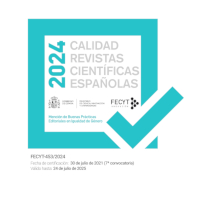Written in Queer
"Zezé" by Ángeles Vicente
DOI:
https://doi.org/10.18172/cif.5800Keywords:
Zezé, Feminism, Queer Theory, Sexuality, Dissident Identity, Lesbian LiteratureAbstract
This research aims to examine Ángeles Vicente’s novel, Zezé (1908), through a doble perspective. First, and with the goal of contextualizing this investigation, it will trace the precedents of Queer Theory in the narration paying attention to the contributions of Nietzsche and Foucault. Secondly, it will focus on one of the cornerstones of this theoretical approach: the sexuality. Certain analysis and considerations offered by Rubin, Wittig, Lorde and Butler will open a dialogue about themes in the novel such as identity, repression and liberation. Furthermore, this research will observe the mechanisms of power and exclusion that institutions implement around sexuality.
Downloads
References
BERNINI, L. (2018). Las Teorías Queer: Una introducción. Barcelona, Egales.
BUTLER, J. (2007). El género en disputa. El feminismo y la subversión de la identidad. Barcelona, Paidós.
FOUCAULT, M. (2003). Sobre la Ilustración. Madrid, Tecnos.
FOUCAULT, M. (2007). Historia de la sexualidad 1. La voluntad de saber. México DF, Siglo XXI Editores.
JAGOSE, A. (1996). Queer Theory. An Introduction. New York, New York University Press.
LEAL REYES, C. (2016). “Sobre las dimensiones del pensamiento queer en Latinoamérica: teoría y política”. Aposta. Revista de Ciencias Sociales, 70, 170-186.
LORDE, A. (1978). “Los usos de lo erótico: La erótica como poder”. https://sentipensaresfem.wordpress.com/2016/12/03/ueecpal/.
NIETZSCHE, F. (2007). La Gaya Ciencia. Madrid, Edaf.
PÉREZ, M. (2016). “Teoría Queer, ¿para qué?”. ISEL, 5, pp. 184-198. https://www.aacademica.org/moira.perez/33.pdf
PIEDRA ALEGRÍA, J. (2018). “Un Nietzsche extraño: Intersecciones entre el pensamiento Nietzscheano y la teoría queer”. Praxis. Revista de filosofía, 77, 1-19. DOI: https://doi.org/10.15359/77.3
TRUJILLO BARBADILLO, G. (2008). “Sujetos y miradas inapropiables/adas: el discurso de las lesbianas queer”. En PLATERO, R. (coord.). Lesbianas. Discursos y representaciones. Barcelona, Melusina.
TRUJILLO BARBADILLO, G. (2009). “Del sujeto político de la mujer a la agencia de las otras mujeres. El impacto de la crítica queer en el feminismo del estado español”. Política y sociedad, 46 (1), 161-172.
RICH, A. (1996a) “Heterosexualidad obligatoria y existencia lesbiana (1980)”. Duoda, Revista d’Estudis Feministes, 10, 15-45.
RICH, A. (1996b) “Heterosexualidad obligatoria y existencia lesbiana (conclusión)”. Duoda, Revista d’Estudis Feministes, 11, 13-37.
RUBIN, G. (1989). “Reflexionando sobre el sexo: notas para una teoría radical de la sexualidad”. En VANCE, C. (ed.). Placer y peligro. Explorando la sexualidad femenina. Madrid, Revolución, pp.113-190.
SUÁREZ BRIONES, B. (2014). “Feministaslesbianasqueer”. En SUAREZ BRIONES, B. (ed). Feminismos lesbianos y queer. Representación, visibilidad y políticas. Madrid, Plaza y Valdés Editores, pp. 17-33.
TORRAS, M. (2000). “Feminismo y crítica lesbiana: ¿una identidad diferente”. En SEGARRA, M y CARABÍ, A. (eds). Feminismo y crítica literaria. Barcelona, Icaria, pp. 121-142.
VICENTE, A. (2005). Zezé. Madrid, Ediciones Lengua de Trapo.
WITTIG, M. (2006). El pensamiento heterosexual y otros ensayos. Madrid, Egales.
Downloads
Published
How to Cite
Issue
Section
License
Copyright (c) 2023 Ainoa Iñigo Clavo

This work is licensed under a Creative Commons Attribution 4.0 International License.
The authors retain copyright of articles and authorize CIF the first publication. They are free to share and redistribute the article without obtaining permission from the publisher as long as they give appropriate credit to the editor and the journal.
Self-archiving is allowed too. In fact, it is recommendable to deposit a PDF version of the paper in academic and/or institutional repositories.
It is recommended to include the DOI number.
This journal is licensed under a Creative Commons Attribution 4.0 International License














